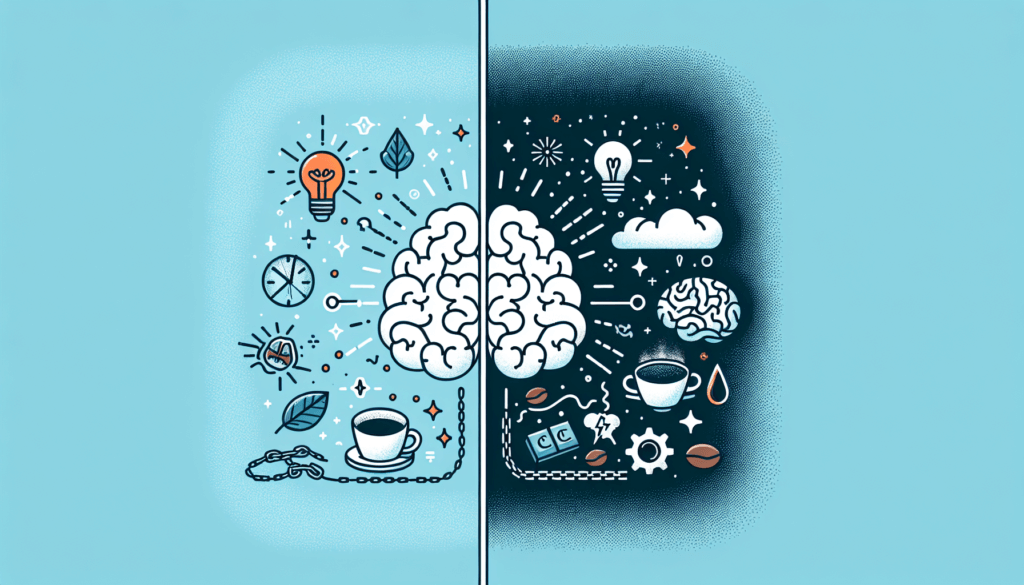Are you considering cutting back on your coffee consumption? In recent years, there has been a growing debate about whether it is beneficial to steer clear of this beloved beverage. While many people rely on coffee to kickstart their day, others worry about the potential drawbacks it may have on their health. In this article, we will explore the arguments for and against avoiding coffee, allowing you to make an informed decision about your own caffeine intake. So, should you think twice before reaching for that morning cup of joe? Let’s find out.

Caffeine Content and Effects
Caffeine’s effect on the body
Caffeine is a natural stimulant that affects the body in several ways. When consumed, it stimulates the central nervous system, providing increased alertness and reducing fatigue. Caffeine also enhances cognitive function, improving focus, concentration, and memory. It can even elevate mood and provide a temporary boost in energy.
Benefits of caffeine consumption
Moderate caffeine consumption can offer various benefits. Many people rely on caffeine to jump-start their day or stay awake during long working hours. It can improve athletic performance by enhancing endurance and reducing perceived exertion. Additionally, caffeine has been linked to a lower risk of certain diseases, such as Parkinson’s disease, type 2 diabetes, and liver disease.
Harmful effects of consuming too much caffeine
While caffeine can be beneficial in moderation, excessive consumption can have negative effects on the body. Consuming too much caffeine can lead to insomnia, restlessness, and anxiety. It may also cause digestive issues like acid reflux, heartburn, and an upset stomach. High levels of caffeine can elevate blood pressure and increase the risk of heart palpitations or irregular heartbeat. It is important to be mindful of individual tolerance and consume caffeine in moderation.
Impact on Sleep
How caffeine affects sleep
Caffeine is a known sleep disruptor due to its stimulating effects. When consumed, caffeine blocks the brain’s adenosine receptors, which are responsible for promoting sleepiness. This inhibits the sleep-inducing effects of adenosine and makes it harder to fall asleep. Even if you do manage to fall asleep after consuming caffeine, it can reduce the quality and duration of your sleep, leading to a restless night and grogginess the next day.
Negative consequences of poor sleep
Getting enough quality sleep is crucial for overall health and well-being. Poor sleep can lead to a range of negative consequences, including decreased cognitive function, impaired memory, and difficulty concentrating. It can also weaken the immune system, making you more susceptible to illnesses. Chronic sleep deprivation has been linked to an increased risk of conditions such as obesity, diabetes, and cardiovascular disease.
Tips for better sleep
If you’re looking to improve your sleep quality, it’s important to manage your caffeine intake. Avoid consuming caffeine close to bedtime, as its effects can last for several hours. Establish a relaxing bedtime routine to signal to your body that it’s time to wind down. Limit exposure to screens and bright lights before bed, as they can interfere with your natural sleep-wake cycle. Creating a comfortable sleep environment and prioritizing consistent sleep schedules can also contribute to better sleep.

Potential Health Benefits of Avoiding Coffee
Reduced risk of acid reflux and stomach issues
One potential health benefit of avoiding coffee is a reduced risk of acid reflux and other stomach issues. Coffee is known to increase stomach acid production, which can lead to heartburn and acid reflux. By eliminating coffee from your diet, you may experience less discomfort and have a healthier digestive system.
Improved dental health
Coffee is notorious for staining teeth. The dark pigments in coffee can seep into the enamel, leading to yellowing or discoloration over time. By cutting back on coffee or avoiding it altogether, you can help maintain a brighter smile and better overall dental health.
Decreased reliance on caffeine
By avoiding coffee, you can gradually decrease your reliance on caffeine as a stimulant. This can have positive effects on your overall energy levels and reduce potential dependency on caffeine for daily function. Without relying on caffeine, you may find that your natural energy levels and ability to stay awake and alert improve over time.
Potential Health Risks of Avoiding Coffee
Risk of withdrawal symptoms
If you’ve been consuming coffee regularly and decide to quit altogether, you may experience withdrawal symptoms. These can include headaches, irritability, fatigue, and difficulty concentrating. However, these symptoms are temporary and typically resolve within a few days. Gradually reducing your coffee intake or switching to decaffeinated alternatives can help minimize withdrawal symptoms.
Increased risk of certain diseases
While moderate coffee consumption has been associated with a decreased risk of certain diseases, avoiding coffee altogether may increase the risk of developing some conditions. For example, studies have shown that regular coffee consumption may protect against liver disease, certain types of cancer, and even neurological disorders like Parkinson’s disease. It’s important to note that the relationship between coffee consumption and disease risk is complex, and individual factors should be taken into consideration.
Impact on mood and cognitive function
Coffee has been known to improve mood and cognitive function. The caffeine in coffee can enhance alertness and boost brain activity, which can positively impact mood and cognitive processes. By avoiding coffee, you may miss out on these potential benefits. However, it’s worth noting that individual responses to caffeine can vary, and some people may experience anxiety or jitters as a result of consuming coffee. Listening to your body and understanding your personal tolerance is key.

Hydration and Dehydration
Does coffee cause dehydration?
There is a common misconception that coffee can cause dehydration. While caffeine does have mild diuretic effects, meaning it increases urine production, the overall impact on hydration is minimal. Moderate coffee consumption is unlikely to cause significant dehydration, especially if you are adequately hydrated with other fluids throughout the day.
Balancing caffeine intake with water consumption
To ensure proper hydration, it’s important to balance your caffeine intake with adequate water consumption. Aim to drink water alongside your coffee or other caffeinated beverages. Staying properly hydrated throughout the day can help counteract any potential diuretic effects of caffeine and maintain overall hydration levels.
Other sources of hydration
While coffee is a popular choice for many individuals to stay hydrated, it’s important to remember that there are other sources of hydration available. Water remains one of the best options for staying properly hydrated. Herbal teas, fruit-infused waters, and electrolyte-rich beverages can also contribute to your daily hydration needs.
Effects on Digestive System
Coffee’s role as a laxative
Coffee has long been known to have a laxative effect on the digestive system. This is due to the combination of caffeine and other compounds found in coffee, such as chlorogenic acid. These substances stimulate the muscles in the digestive tract, promoting bowel movements and relieving constipation.
Impact on bowel movements
If you’re someone who struggles with regular bowel movements, coffee can provide temporary relief. However, it’s important to note that relying solely on coffee as a laxative can lead to dependence and ultimately disrupt natural bowel function. Balancing coffee consumption with a fiber-rich diet, regular exercise, and adequate hydration is key to maintaining healthy bowel movements.
Lower risk of gastrointestinal issues
While coffee can have a positive impact on bowel movements, excessive consumption or sensitivity to coffee can lead to gastrointestinal issues. Some individuals may experience acid reflux, heartburn, or an upset stomach after consuming coffee. By avoiding coffee, these individuals may find relief from such symptoms and have better overall gastrointestinal health.

Pregnancy and Breastfeeding
Safe levels of caffeine consumption
During pregnancy and breastfeeding, it’s important to be mindful of caffeine intake. The American College of Obstetricians and Gynecologists recommends limiting caffeine consumption to 200 milligrams per day during pregnancy. This is roughly equivalent to one 12-ounce cup of coffee. Breastfeeding mothers are advised to consume caffeine in moderation and pay attention to any potential reactions their baby may have.
Potential risks for the baby
High levels of caffeine during pregnancy have been associated with a higher risk of preterm birth, low birth weight, and developmental issues. Caffeine can also pass into breast milk, potentially affecting the baby. It’s important to weigh the potential risks and benefits of caffeine consumption during these periods and consult with a healthcare provider for personalized guidance.
Alternatives to coffee during pregnancy and breastfeeding
To fulfill your desire for a warm, comforting beverage during pregnancy or while breastfeeding, there are plenty of alternatives to coffee. Herbal teas, decaffeinated coffee, or caffeine-free beverages like decaf chai or herbal lattes can be enjoyable substitutes. These options can provide a sense of routine and relaxation without the potential risks of caffeine.
Weight Management
Caffeine’s impact on metabolism
Caffeine has been shown to mildly increase metabolism and enhance fat oxidation, making it a common ingredient in weight loss supplements. By stimulating the central nervous system, caffeine can temporarily boost calorie burning and potentially aid in weight management.
Appetite suppression and calorie burning
Caffeine can also act as an appetite suppressant, leading to reduced calorie intake. It can help increase feelings of fullness and satiety, making it easier to control portions and resist unnecessary snacking. However, it’s important to note that the effects of caffeine on appetite can vary between individuals, and long-term weight management should prioritize a balanced diet and regular exercise.
Effectiveness for weight loss
While caffeine may offer some benefits for weight management, it’s not a magic solution for losing weight. Any potential effects of caffeine are likely to be modest, and long-term weight loss is best achieved through sustainable lifestyle changes. Incorporating a balanced diet, regular physical activity, and mindful eating habits are key components of successful weight management.

Impact on Anxiety and Stress
Coffee’s effect on anxiety levels
Coffee’s stimulating effects can exacerbate anxiety symptoms in some individuals. Caffeine can increase heart rate, elevate blood pressure, and promote restlessness or jitters, which can contribute to feelings of anxiety. If you’re prone to anxiety or have been diagnosed with an anxiety disorder, it may be beneficial to reduce or avoid caffeine consumption.
Ways to manage anxiety without coffee
If you’re looking to manage anxiety without the help of coffee, there are alternative strategies you can try. Engaging in regular physical activity, practicing relaxation techniques such as deep breathing or meditation, and seeking support from a mental health professional can all contribute to anxiety reduction. It’s important to find what works best for you and listen to your body’s needs.
Stress reduction techniques
Stress management is crucial for overall well-being, and finding healthy ways to cope with stress is essential. Engaging in activities you enjoy, spending time with loved ones, and practicing self-care can all help reduce stress levels. Finding healthy outlets for stress, such as exercise, hobbies, or creative pursuits, can be beneficial alternatives to relying on coffee as a stress-reliever.
Personal Tolerance and Preference
Understanding individual caffeine sensitivity
Every individual has a unique tolerance to caffeine, and it’s important to understand your own sensitivity. Some people are more sensitive to the effects of caffeine and may experience increased heart rate, jitters, or anxiety even with low to moderate consumption. Others may have a higher tolerance and require more caffeine to achieve the same effects. Paying attention to how your body responds to caffeine can help you make informed choices about your consumption.
Factors influencing preference for or avoidance of coffee
Personal preference for coffee or avoidance of it can be influenced by various factors. Taste preferences, cultural background, health considerations, and individual lifestyle choices can all play a role. Some individuals may simply not enjoy the taste of coffee or may have experienced negative side effects from consuming it. Others may choose to avoid coffee for religious or cultural reasons. It’s important to respect and listen to your own preferences and make choices that align with your overall health and well-being.
Listening to your body’s signals
Ultimately, the decision to consume or avoid coffee should be based on how your body responds and what feels best for you. Pay attention to how caffeine affects your sleep quality, mood, digestion, and overall well-being. If you notice adverse effects or feel better without coffee, it may be worth exploring alternatives or minimizing your consumption. Trusting and listening to your body’s signals is key to maintaining a healthy and balanced lifestyle.
In conclusion, the choice to consume or avoid coffee is a personal one. While caffeine can provide temporary benefits such as increased alertness and cognitive function, excessive consumption can have negative effects on sleep, anxiety levels, and gastrointestinal health. Avoiding coffee may offer benefits like reduced risk of acid reflux, improved dental health, and decreased reliance on caffeine. However, it’s important to consider individual factors, such as pregnancy or personal tolerance to caffeine. Listening to your body’s signals and making informed choices about caffeine consumption can help maintain optimal health and well-being.


